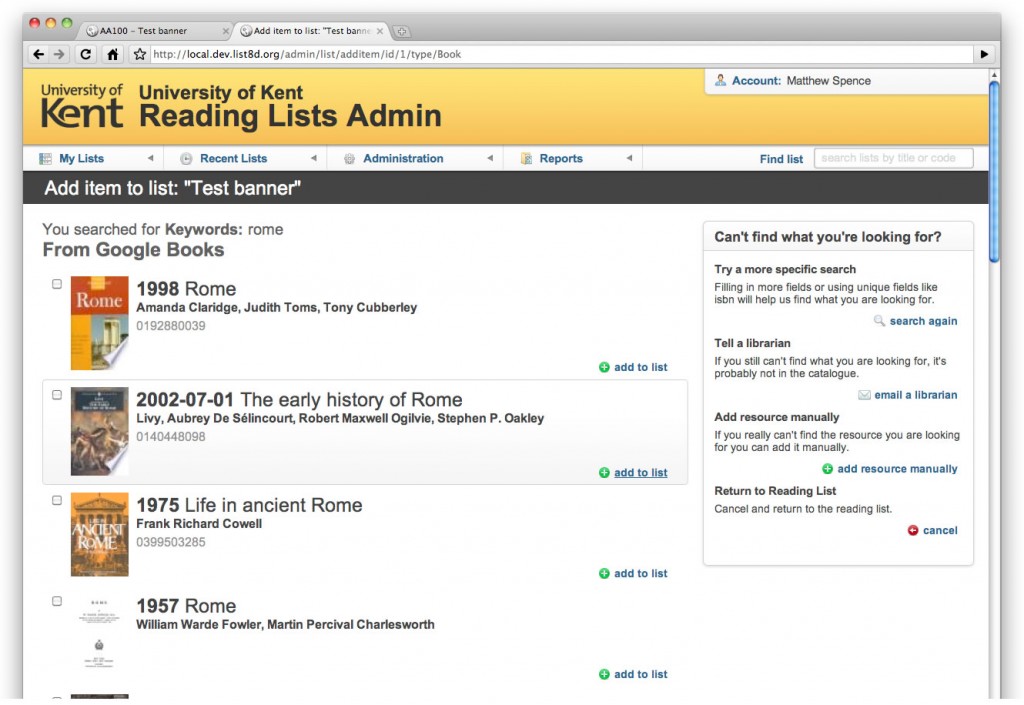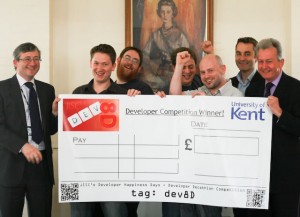Supporting Developer Success: The List8D Story
 “We only hear from our users when things go wrong…” is a common complaint from software developers.
“We only hear from our users when things go wrong…” is a common complaint from software developers.
But what happens when a team of higher education developers hear when things go right? The result is not just happier, more productive developers but an innovative tool to help academics, students and librarians to manage reading lists, and great publicity for their university. This is the List8D story.
The Dev8D effect
It began a year ago, in February 2009, when a group of six software developers from the University of Kent were sent to Dev8D, a four-day developer conference in London, an event which has been organised by DevCSI for the last two years. “We didn’t really know what to expect,” says Ben Charlton, the university’s computing officer. “We wondered if it was all a bit of a jolly…” he admits, slightly sheepishly. In the event, the outcome of those four days far exceeded the expectations of not only the developers but also their managers and university. The catalyst was that, alongside the workshops, training sessions, talks by industry experts and code labs, one of the key elements of Dev8D was a rapid prototyping competition where developers came up with speedy solutions to technological problems. The Kent team chose to focus on an area that had been an issue at their institution for some time: reading list management.
The problem space
Reading lists are crucial for effective teaching and learning but Kent’s system was failing on many levels. Some academics would upload Word documents or PDFs, others webspages, and others nothing at all, as Katie Edwards, faculty assistant coordinator at Kent’s Templeman Library, explains: “Library staff used to try to put up the lists themselves but we weren’t getting the reading lists in from departments. This meant that we were not getting the full data about books, we didn’t know whether to buy books, and as the system couldn’t run reports we couldn’t find out about the usage of a book across modules.”
Through talking to other developers at Dev8D, the Kent team soon realised that it was not just a problem for their institution but a wider issue across the sector. They came up with what they thought was a useful solution: a web 2.0-friendly system with software that makes it easy for academics to create reading lists, libraries to manage stock and students to access the lists on a variety of devices. Although the developers had long known that there was an issue with reading list management at Kent, Dev8D provided the ideal environment to think creatively about the problem for the first time.
“We were completely away from our normal environment so there were no distractions like email, the telephone…” says Ben Charlton. “By having other people you don’t normally work with to bounce ideas off you get people suggesting things that you wouldn’t ordinarily have thought about. Being able to talk over those ideas with people from a completely different background was very useful.”

Screenshot of the Reading List Admin Screen
Prizes!
The Dev8D community agreed and awarded the Kent developers the top prize for their List8D user-friendly reading list management system. The prize provided funding for the team to continue developing their idea back at their home institution but also, and perhaps more important for the developers than the cash itself, the award showed that their peers understood, appreciated and were prepared to reward what they were doing.
“It was great that as well as the Dev8D prize we seemed to have a lot of people here getting excited about the idea,” says Ben Charlton. “When you come up with an idea with a collection of people that you work with on a regular basis and you enjoy working with then it’s nice when, collectively, you all feel appreciated.”
His colleague, Matt Spencer, agrees:
“It’s really important to get validation. When you design stuff for end users, often if you’ve done your job properly and the application works then it should be seamless and the users aren’t really aware of it, and therefore the only positive feedback you get is no feedback. If you haven’t got any emails in your inbox moaning about how something isn’t working that’s generally the only validation you get from users. It’s rare for them to step forward and say this is a really good project, thank you for delivering the solution. To actually get some positive feedback from our peers and for them to give an idea the rubberstamp of approval and say this is good stuff and we’re going to invest some money in it to allow you to develop it further for the community, well, it lets you know that what you are doing is good and that people want to see more of it.”

The Kent team with their winnings
Further support
It was also vital to the project and its developers that the support continued once they were out of the Dev8D environment and back in their regular workplace. The team were fortunate that they had a manager, Michael Wilcox, Kent’s head of web development and support services, who appreciated the effort they had put into Dev8D and the skills and knowledge they had gained. He was keen to see his developers integrate what they had learnt over the four days into their day-to-day work.
“They gained a huge amount. They came back very enthusiastic and full of good ideas. It did a great deal for morale and motivation…. It’s a very powerful thing when your peers say that you are doing something the best,” says Wilcox.
He decided to use the momentum of Dev8D to move forward with agile working and the List8D project by providing the development team with two very important assets: physical and mental space.
A room in the library was repurposed as ‘The Hub’. Kitted out with whiteboards and caffeine supplies, it has become a dedicated space for developers to get together to work on projects in the style of Dev8D, where the team had discovered that development doesn’t only happen behind a computer but also through intensive collaborative brainstorming, scribbling code on whiteboards and bouncing ideas off each other. Moving towards that process has also required a shift in priorities, away from working on a number of different projects at the same time and towards dedicating concentrated time to a specific project and making real achievements on it before moving on to the next one. The team agree that it has fundamentally changed the way that they work, and for the better.
“We get more done as we are not having to do so much swapping between projects,” says developer Simon Yeldon. “Dev8D inspired us all to take back what we’d learnt and to refocus us on achieving rather than maintaining and our managers listened to what we had learned there. It is so important to have that validation from your boss and know that they are willing to make the leap of faith of committing all of their resources to something, more than they would have in the past, because they know that the approach we are taking works and they will get a project at the end of it.”
Dev8D also helped Wilcox to manage his team more effectively. He had been keen to experiment with agile development techniques and Dev8D offered an opportunity for his team to find out more from other developers and try it out on a small scale. “As they were at the heart of the change it really helped me to move things forward because I wasn’t trying to impose something on them they didn’t know much about or weren’t interested in,” explains Wilcox.
JISC Rapid Innovation support
List8D benefited immensely from the new agile approach introduced at Kent after Dev8D, with the developers’ dedicated time facilitated by a grant from the JISC Rapid Innovation programme. This enabled six developers to do two days work a week on the project for three months.
“The fact that List8D was JISC-funded and therefore given money and a deadline with a responsibility to meet that deadline has really given us focus and stopped other projects parachuting in and shifting the focus,” says Matt Spencer.
The JISC funding also helped Wilcox and his team to make the decision to go down the open source route with List8D. The team are building a community around the software to encourage developers in other institutions to pick it up, adapt it for their own particular needs and create a better product for everyone along the way. It makes sense for Kent as it helps to build a readymade IT support group for the software – “the more people we can get involved the better it is for everybody,” explains Ben Charlton - while having Kent-designed software talked about throughout the sector is also a great boost for the university’s reputation.
“The publicity about the Dev8D prize went to various websites and it was in the JISC Inform newsletter. That got the attention of some of the senior managers at the university and, reportedly, it was in the in-tray of the vice-chancellor,” says Michael Wilcox. “I think it’s very important to be able to show the influences in the place that we’ve got a good team and we’re getting recognition.”
The benefits
Most importantly, though, List8D benefits the users. Katie Edwards, who has been working with the development team and the academic faculties to ‘Kentify’ the system ready for rollout, explains:
“It’s really going to help the students as we will have full reading lists in the new system so we will know what books we need in the library and what books we need to order. It will be easier for academics to manage their list and send messages to library staff through the system. It benefits all parties.”
And the developers? Ben Charlton sums up the team’s experiences enthusiastically:
“For a start, we’re all a lot happier, which is no bad thing! We feel that we’ve gained a lot in that we’ve learnt some techniques such as prototyping mechanisms we wouldn’t otherwise have done, and been shown them by people who really know what they’re doing. We came back with a good idea we may not otherwise have done and that’s going to provide value to the university. As a result of Dev8D we’re developing a system that’s hopefully going to massively improve the management of our reading lists. And without Dev8D that probably wouldn’t have happened.”
Hear More From the Kent Team
The team’s manager, Michael Wilcox, speaks to Michelle Pauli about why he sent his staff to Dev8D and what he feels they gained from the experience in this video interview…
Developers Simon Yeldon and Matt Spencer speak to Michelle about their perspective of the Dev8D and List8D experiences in this video interview…
Computing Officer Ben Charlton discusses his involvement in the List8D project and how Dev8D helped to make the project happen in this video interview…
You can also hear a full interview with Katie Edwards here.










Recent Comments